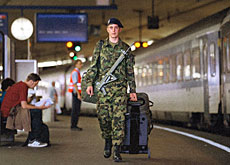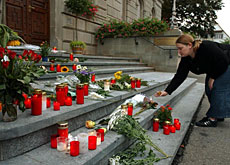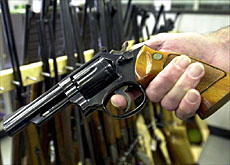Army rifles remain racked at home

Switzerland’s long-standing tradition of soldiers keeping their rifles at home looks set to continue – at least for the time being.
Despite the use of an army-issue rifle in a massacre in a local Swiss parliament in 2001, the defence ministry says it will maintain the practice.
“Everybody who has served in the army is allowed to keep their personal weapon, even after the end of their military service,” the defence ministry said in a statement.
The ministry reiterated its position after it was revealed that the government is planning to impose restrictions on the type of weapon allowed to be stored at home.
About 500,000 Swiss keep a rifle at home, mainly because the militia system requires men over 20 to be ready for military service.
Soldiers who have been demobilised have the right to keep their rifles for annual summer shooting practices held in nearly every Swiss town and village.
Dire straits
“Up until the late 19th and early 20th century, soldiers were obliged to keep their own equipment and their own weapons at home,” Peter Hug, a historian at Bern University, told swissinfo.
This obligation often caused dire financial straits within a family as the soldiers had to pay for their own equipment. “People in rural areas were often hit especially hard,” said Hug.
According to Hug, during the early 18th century every man who wanted to get married had to have a uniform and a weapon in order to get permission to tie the knot.
“But when protectionism arrived in the 1880s the government earned so much money from customs duty that it could afford to pay for soldiers’ weapons,” he said.
From that time on Swiss soldiers no longer had to pay for their rifles; however, they were obliged to maintain and look after them. Even today soldiers have to replace everything that is lost or broken.
“If someone lost their rifle they would get in trouble with the law,” added Hug.
Ammunition
Even though the government decided to pay for the rifles there was still some confusion over what to do about ammunition.
“In 1891 the federal authorities decided to hand out so-called ‘pocket ammunition’. This enabled the infantry to respond immediately in case of an attack,” said Hug.
The government thought that some soldiers would see action before the army was fully mobilised, which normally took three days.
The country’s shooting clubs, which were heavily subsidised by the defence ministry, also played a key role in ensuring soldiers kept their rifles at home.
Tradition
But this old tradition has come under fire from critics who say that weapons and ammunition could be misused.
Supporters disagree, arguing that individual cases of misuse are an exception and that far more people are killed on the roads than by an army-issue rifle.
But opponents do not share this view. “I am always worried we could have a tragedy where a madman runs amok and shoots 20 people in Zurich,” said Martin Kilias, a Lausanne-based criminologist.
This fear became a reality in September 2001 when a gunman killed 14 politicians in the local parliament in Zug. The 57-year-old was carrying a Swiss army weapon.
Despite the Zug incident, which resulted in tighter security at public buildings in Switzerland, the military refuses to budge on the issue.
However, Hug thinks public pressure could actually make this symbol of national identity disappear in the next ten years.
swissinfo, Urs Maurer
The Swiss Army:
120,000 full-time soldiers
80,000 reserves
20,000 on initial training
Defence minister Samuel Schmid wrote to the cantons in March, telling them that soldiers would not be allowed to take the new standard-issue rifle home from the beginning of next year.
Soldiers owning the old standard-issue rifle will be allowed to keep them under certain conditions.
They will have to register with the local authority and undergo training.
Last year the former justice minister, Ruth Metzler, called for all firearms to be centrally registered.

In compliance with the JTI standards
More: SWI swissinfo.ch certified by the Journalism Trust Initiative










You can find an overview of ongoing debates with our journalists here . Please join us!
If you want to start a conversation about a topic raised in this article or want to report factual errors, email us at english@swissinfo.ch.